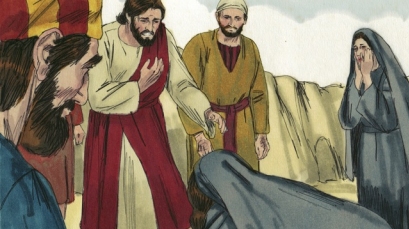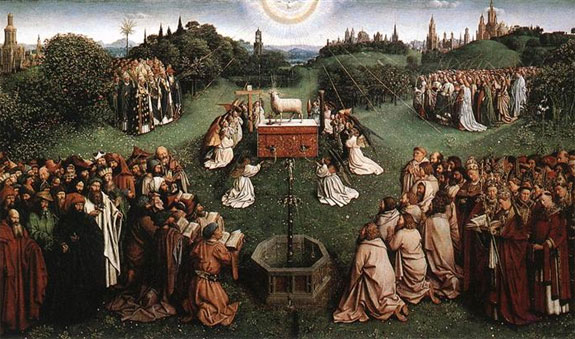 I love, love, love the story about Jesus raising Lazarus from the dead. The Lord often reminds me of it when I’m trying to pretend that everything is okay (like he doesn’t know everything!). I can’t tell you how many times in prayer I’ve felt the gentle nudging to be honest with Him but insist that I’m “fine”. In these times I’m invited to have the honesty of Mary and Martha – to get angry, because God can handle it! Martha and Mary didn’t meekly say, “oh it’s okay Jesus, we know this is for the best and we trust you.” No, they were not afraid to show that they were angry and confused: “what the heck Jesus! You go around doing all these great miracles but you can’t stop our brother, who you claimed to love, from dying. Some Messiah you are!”
I love, love, love the story about Jesus raising Lazarus from the dead. The Lord often reminds me of it when I’m trying to pretend that everything is okay (like he doesn’t know everything!). I can’t tell you how many times in prayer I’ve felt the gentle nudging to be honest with Him but insist that I’m “fine”. In these times I’m invited to have the honesty of Mary and Martha – to get angry, because God can handle it! Martha and Mary didn’t meekly say, “oh it’s okay Jesus, we know this is for the best and we trust you.” No, they were not afraid to show that they were angry and confused: “what the heck Jesus! You go around doing all these great miracles but you can’t stop our brother, who you claimed to love, from dying. Some Messiah you are!”
I think the key to understanding this story is the fact that Mary and Martha never lost their faith. They believed with their whole hearts that he could have healed their brother and Martha even says, “even now I know that whatever you ask from God, God will give you.”
These two sisters believed that Jesus could do anything, they just didn’t realize “anything” included raising men from the dead. This is something they couldn’t imagine. Our God does more than we can ask or imagine.
But the part that we still struggle with is why Jesus let Lazarus die in the first place. Because he loved them. Logically speaking, this is completely insane. Let’s talk about my ways are not your ways. Jesus even goes so far as to say, “for your sake I am glad I was not there”. Can you imagine the disciples shock and confusion over this?
Jesus allows Lazarus to die because in the end, it is better for everyone. I’ve wondered if this was to give them all hope during Jesus’s crucifixion. They must have thought: He raised Lazarus from the dead, perhaps He will rise also. God allows a brief period of pain and mourning, to make the new day that much more brilliant.
One thing I learned in convent was that I hate suffering (okay who really likes it?). But I really struggle to see the value in it, which I think is true to most of us. We believe in a God whose plan to save us involved letting His Son die in utter agony by being crucified. I know we’ve all struggled with the questions “why suffering?” and “why do good things happen to bad people?” Maybe you’ve even tried to explain redemptive suffering to others and think you really get it. But deep in each of our hearts we all ask, “why?”
Why does God allow so much evil? Why do little children get shot, abused and horribly mistreated? Free will, we like to throw around. Is that a satisfactory answer? God could just stop it all if He wanted. And then what would draw us close to Him?


 I love, love, love the story about Jesus raising Lazarus from the dead. The Lord often reminds me of it when I’m trying to pretend that everything is okay (like he doesn’t know everything!). I can’t tell you how many times in prayer I’ve felt the gentle nudging to be honest with Him but insist that I’m “fine”. In these times I’m invited to have the honesty of Mary and Martha – to get angry, because God can handle it! Martha and Mary didn’t meekly say, “oh it’s okay Jesus, we know this is for the best and we trust you.” No, they were not afraid to show that they were angry and confused: “what the heck Jesus! You go around doing all these great miracles but you can’t stop our brother, who you claimed to love, from dying. Some Messiah you are!”
I love, love, love the story about Jesus raising Lazarus from the dead. The Lord often reminds me of it when I’m trying to pretend that everything is okay (like he doesn’t know everything!). I can’t tell you how many times in prayer I’ve felt the gentle nudging to be honest with Him but insist that I’m “fine”. In these times I’m invited to have the honesty of Mary and Martha – to get angry, because God can handle it! Martha and Mary didn’t meekly say, “oh it’s okay Jesus, we know this is for the best and we trust you.” No, they were not afraid to show that they were angry and confused: “what the heck Jesus! You go around doing all these great miracles but you can’t stop our brother, who you claimed to love, from dying. Some Messiah you are!”